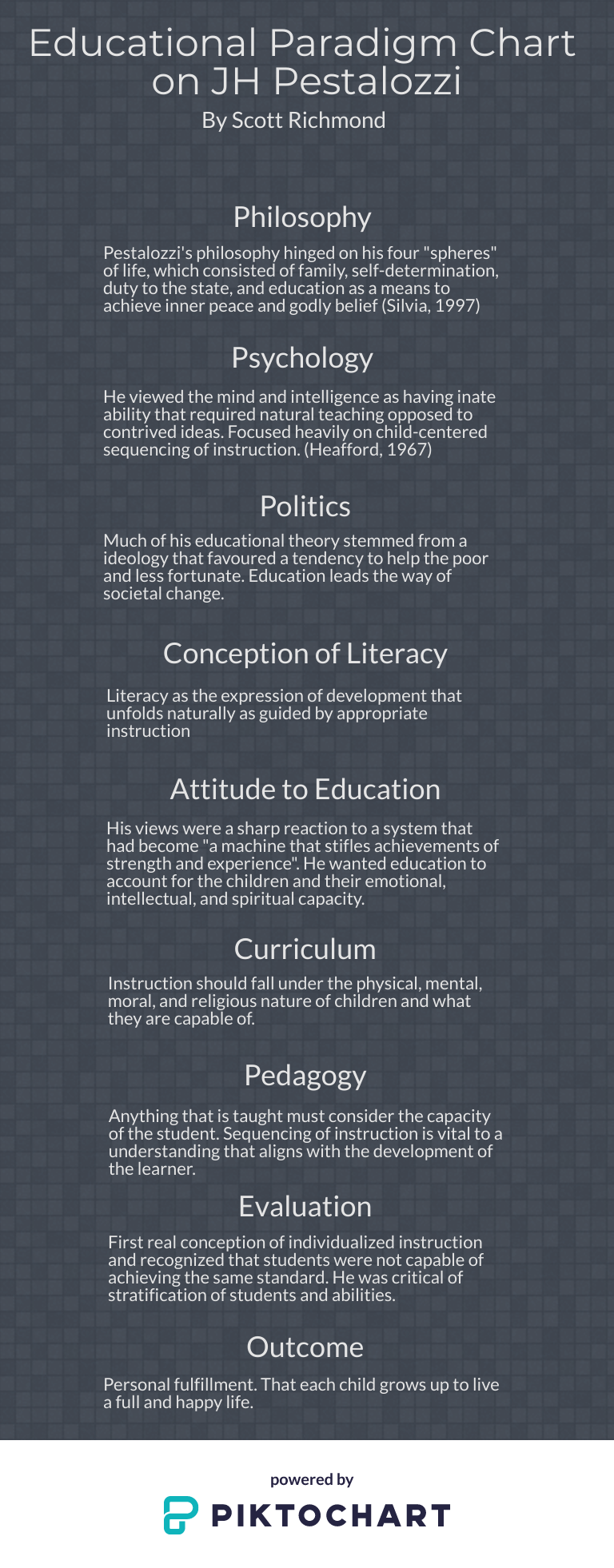
J.H. Pestalozzi was an eighteenth-century educational philosopher from Zurich who was greatly influenced by his poor upbringing. He lost his father at the age of six and he credited his “unstable” environment and lack of a “firm guiding hand” is what ultimately led to his ideas on education and politics.
This external environment caused him to spend an inordinate amount of time with the poor. Combine this with the fact that at that time, Zurich was a relatively liberally-minded city, and social issues were very much on the minds in the area. The result was a socially-oriented young man who wanted more for the common citizen. He believed strongly in humanitarian values; that humanitarianism was critical to helping those who are less fortunate.
In 1797 he wrote the book “Investigations into the course and nature of human development”. This work did not get much attention at the time but went a long way in clarifying his developing ideas on the importance of education, specifically how it ought to work with the natural desires and instincts of humans, rather than compete against it. (Heafford, 1967)
The outbreak of the French Revolution in 1789 and decades of politically unstable Zurich was just the setting needed to crystalize his percolating beliefs in education for all beyond the aristocratic class.
His educational ideas were a definitive reaction to a system that valued intense discipline by schoolmasters, tradition, routine, rigidity, and memorization without context. He was strongly influenced by the ideas of Rousseau, who posited that children have various capacities that are directly tied to natural development. Rousseau and Pestalozzi’s work laid the foundation for later educational theorists Lev Vygotsky’s zone of proximal development and Jean Piaget’s stages of development.
He developed a “method” of instruction that leaned on developmentally-appropriate instruction that was within the grasp of what the child was capable of learning. Sequencing of learning was also important, and it could be inferred that this was a manifestation of how he viewed the psychology of learning. We know that quality learning happens when new ideas are connecting to existing ideas, and Pestalozzi was absolutely correct in this way. His methods were considered more natural than previous methods that were contrived by what adults thought children ought to be capable of. This reminds me of a recent movement toward individualized education, which is again a reaction to an overly-standardized system.
He saw talents and intelligence as mostly innate but believed that deficits in these areas could be mitigated in the early years with good education, much in the same way as Carol Dweck writes about mindset and how environmental factors can affect outcomes.
Pestalozzi’s idea of an improved education system valued the character, personality, and learning of the whole child. He advocated for the adaptation of materials and methods that more closely matched the children themselves and their capacities and needs, as opposed to the then-tradition of top-down forming of children into small adults.
References
de Castell, S., & Luke, A. (1983). Defining literacy in North American schools: Socio-historical conditions and consequences. In de Castell, Luke and Egan (Eds) Literacy, Society, and Schooling. Cambridge, England: Cambridge University Press.
Heafford, M., & Taylor & Francis eBooks A-Z. (1967). Pestalozzi: His thought and its relevance today. New York;London, [England];: Routledge.
Silvia, Schmid (1997), “Pestalozzi’s Spheres of Life”, Journal of the Midwest History of Education Society
